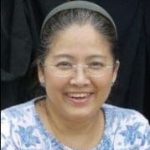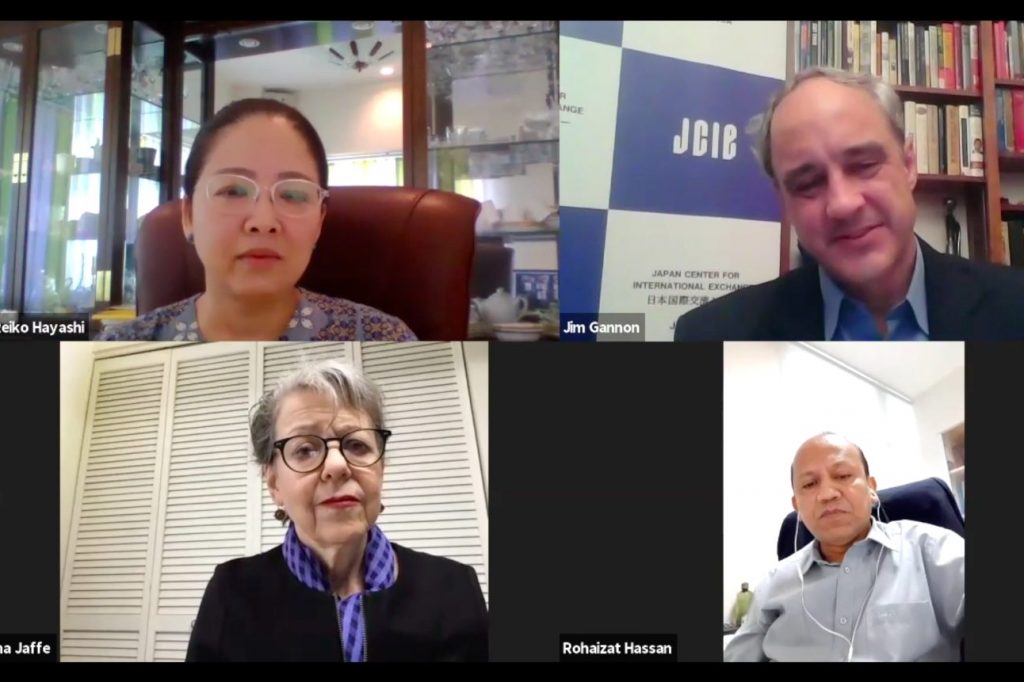It has become clear that the COVID-19 pandemic is disproportionately impacting older people around the globe. Older people are more vulnerable to developing serious complications as a result of COVID-19 infection. Additionally, older people are more likely to be negatively affected by efforts to mitigate the spread of the disease, such as social distancing, which can compound the social isolation that many of them already face.
In light of this serious challenge, JCIE and the Economic Research Institute for ASEAN and East Asia (ERIA) co-hosted a webinar that shared lessons from the United States on how the epidemic has impacted older persons, particularly those in long-term care facilities. It was a platform for sharing observations on the US experience—including both challenges and best practices—and comparing them with the experience to date in Japan and Malaysia to draw out lessons that can inform policy for the COVID-19 pandemic and for future outbreaks as well. This event was conducted under the auspices of the Asia Health and Wellbeing Initiative (AHWIN).
A policy brief was also produced based on the discussions at this webinar.
PANELISTS
SPEAKERS
Ina Jaffe, Correspondent, National Public Radio (NPR)
Reiko Hayashi, Deputy Director-General, National Institute of Population and Social Security Research, Japan
Mohd Rohaizat Hassan, Associate Professor, Department of Community Health, National University of Malaysia
OPENING REMARKS
Osuke Komazawa, Special Advisor on Healthcare & Long Term Care Policy, ERIA
MODERATOR
James Gannon, Executive Director, JCIE/USA
INA JAFFE discussed the situation in US nursing homes, which account for more than one-third of all US deaths related to COVID-19.
- The devastating impact of COVID-19 on US nursing homes was due to poor infection control measures in the facilities. Even prior to the pandemic, approximately 390,000 lives are lost in US nursing homes every year to infections, and having people with underlying medical conditions living in close quarters was one of the reasons COVID-19 spread easily in long-term care facilities.
- Certified Nursing Assistants (CNAs) are the main staff providing direct care in nursing homes and they tend to be poorly paid. It is common for them to work in more than one facility and as such, they can carry the virus from one facility to another.
- In facilities where families often assist in caring for their loved one, lockdowns have caused such hands-on care to be lost. This has added to the burden on caregivers in the facilities and to the emotional stress on the residents.
- One strategy in the US that has proven effective in curbing the spread of the virus through nursing homes has been the concept of “cohorting,” or physically separating people who have been exposed to the virus from others.
REIKO HAYASHI shared country data on the impact of COVID-19 and stressed the importance of looking at statistics to capture the big picture.
- From a comparative perspective, the number of fatalities in the United States has been dramatically higher than in Japan or other Asian countries, and the spread of the disease has been much faster. Moreover, the gender balance of fatalities showed clear differences: in Japan, older men were more likely to be the victims compared to older women, but in the United States more fatalities occurred among women aged 85 years or older.
- In Japan, the ratio of COVID-19 fatalities that occurred in long-term care facilities was not as high as in the United States. This may have been thanks to early warnings issued to the staff of those facilities.
- There are many older persons in Japan who utilize long-term care services such as day-care facilities and home-care visits, but these services were suspended during the state of emergency, leaving family caregivers to shoulder the responsibilities of providing elder care.
- The use of smartphones and other technologies by older persons can alleviate social isolation, and therefore further efforts are needed to disseminate those types of communication tools.
- Due to the economic crisis caused by COVID-19, the mass media raised the concern that suicides might increase. However, according to data from the Police Agency, the number of cases in April decreased by 19.8 percent compared to the previous year, which was the sharpest decline in the past five years. This highlights the need to focus on sound statistical evidence rather than anecdotal cases.
ROHAIZAT HASSAN, who served as a member of the management secretariat of COVID-19 Hospital of University Kebangsaan Malaysia (UKM), shared the situation in Malaysia and the approaches taken by the government.
- A recent analysis of data obtained in Malaysia showed that about 67 percent of the COVID-19 deaths in the country were above 60 years old, so it was clear that older people have been severely affected.
- Based on Malaysia’s sociocultural and religious contexts, most older people choose to live with their family members compared to receiving institutionalized care. Those older people who were living alone, however, tended to be isolated during the Movement Control Orders (MCOs).
- In light of the situation of social isolation, Malaysia has taken a multisectoral approach in which the government has provided funding to telecommunication companies, enabling them to offer a package of 1GB of free data and unlimited WhatsApp usage, which has helped families stay connected.
INA JAFFE
 Ms. Jaffe is a veteran NPR correspondent covering the aging of America. Her stories on Morning Edition and All Things Considered have focused on older adults’ involvement in politics and elections, dating and divorce, work and retirement, fashion and sports, as well as issues affecting long-term care and end-of-life choices. In 2015, she was named one of the nation’s top “Influencers in Aging” by PBS publication Next Avenue, which wrote, “Jaffe has reinvented reporting on aging.” Ms. Jaffe was a 2016 JCIE US-Japan Journalism Fellow and worked on a number of pieces covering Japan’s aging populations. In response to the COVID-19 pandemic, Ms. Jaffe has been a leading voice on the impact of the pandemic on the older population in the United States, focusing particularly on the devastating toll it has taken on nursing homes. (Photo by Jennifer Cawley/NPR)
Ms. Jaffe is a veteran NPR correspondent covering the aging of America. Her stories on Morning Edition and All Things Considered have focused on older adults’ involvement in politics and elections, dating and divorce, work and retirement, fashion and sports, as well as issues affecting long-term care and end-of-life choices. In 2015, she was named one of the nation’s top “Influencers in Aging” by PBS publication Next Avenue, which wrote, “Jaffe has reinvented reporting on aging.” Ms. Jaffe was a 2016 JCIE US-Japan Journalism Fellow and worked on a number of pieces covering Japan’s aging populations. In response to the COVID-19 pandemic, Ms. Jaffe has been a leading voice on the impact of the pandemic on the older population in the United States, focusing particularly on the devastating toll it has taken on nursing homes. (Photo by Jennifer Cawley/NPR)
REIKO HAYASHI
 Dr. Reiko Hayashi is deputy director-general of Japan’s National Institute of Population and Social Security Research (IPSS). Prior to joining IPSS in 2012, she served in Senegal as technical advisor to the Minister of Health (2008–2011), as an expert on the development of community health workers in the Project for Development of Human Resources in Health (2002–2003), and was engaged in other projects concerning population and health in various countries. Her research covers health and population development, and her current focus is on global aging and the international migration of care personnel. She holds a PhD in policy studies from the National Graduate Institute for Policy Studies (GRIPS), Japan.
Dr. Reiko Hayashi is deputy director-general of Japan’s National Institute of Population and Social Security Research (IPSS). Prior to joining IPSS in 2012, she served in Senegal as technical advisor to the Minister of Health (2008–2011), as an expert on the development of community health workers in the Project for Development of Human Resources in Health (2002–2003), and was engaged in other projects concerning population and health in various countries. Her research covers health and population development, and her current focus is on global aging and the international migration of care personnel. She holds a PhD in policy studies from the National Graduate Institute for Policy Studies (GRIPS), Japan.
MOHD ROHAIZAT HASSAN
 Dr. Hassan is associate professor in the Department of Community Health, Faculty of Medicine, Universiti Kebangsaan Malaysia (UKM). He obtained his MD from Universiti Sains Malaysia (USM) in 1998 and a master’s degree in community medicine (epidemiology & statistics) in 2009 from UKM. He was awarded a PhD in medical science from Niigata University, Japan in March 2019. He started his earlier career with the Ministry of Health, Malaysia before joining the Faculty of Medicine, UKM in May 2004. His field of interest is in infectious diseases epidemiology focusing on tropical diseases, emerging re-emerging diseases and zoonotic diseases. During this COVID-19 pandemic, he is a committee member of the Management Secretariat for COVID-19 Hospital Canselor Tuanku Muhriz (HCTM) UKM. He is the Head Operational Co-ordinator for surveillance and public health interventions mainly for patients and healthcare workers.
Dr. Hassan is associate professor in the Department of Community Health, Faculty of Medicine, Universiti Kebangsaan Malaysia (UKM). He obtained his MD from Universiti Sains Malaysia (USM) in 1998 and a master’s degree in community medicine (epidemiology & statistics) in 2009 from UKM. He was awarded a PhD in medical science from Niigata University, Japan in March 2019. He started his earlier career with the Ministry of Health, Malaysia before joining the Faculty of Medicine, UKM in May 2004. His field of interest is in infectious diseases epidemiology focusing on tropical diseases, emerging re-emerging diseases and zoonotic diseases. During this COVID-19 pandemic, he is a committee member of the Management Secretariat for COVID-19 Hospital Canselor Tuanku Muhriz (HCTM) UKM. He is the Head Operational Co-ordinator for surveillance and public health interventions mainly for patients and healthcare workers.


